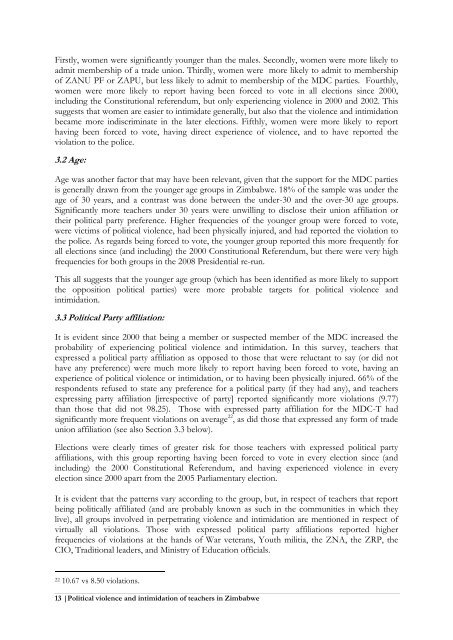Political violence and intimidation against Teachers in Zimbabwe
Political violence and intimidation against Teachers in Zimbabwe
Political violence and intimidation against Teachers in Zimbabwe
Create successful ePaper yourself
Turn your PDF publications into a flip-book with our unique Google optimized e-Paper software.
Firstly, women were significantly younger than the males. Secondly, women were more likely to<br />
admit membership of a trade union. Thirdly, women were more likely to admit to membership<br />
of ZANU PF or ZAPU, but less likely to admit to membership of the MDC parties. Fourthly,<br />
women were more likely to report hav<strong>in</strong>g been forced to vote <strong>in</strong> all elections s<strong>in</strong>ce 2000,<br />
<strong>in</strong>clud<strong>in</strong>g the Constitutional referendum, but only experienc<strong>in</strong>g <strong>violence</strong> <strong>in</strong> 2000 <strong>and</strong> 2002. This<br />
suggests that women are easier to <strong>in</strong>timidate generally, but also that the <strong>violence</strong> <strong>and</strong> <strong><strong>in</strong>timidation</strong><br />
became more <strong>in</strong>discrim<strong>in</strong>ate <strong>in</strong> the later elections. Fifthly, women were more likely to report<br />
hav<strong>in</strong>g been forced to vote, hav<strong>in</strong>g direct experience of <strong>violence</strong>, <strong>and</strong> to have reported the<br />
violation to the police.<br />
3.2 Age:<br />
Age was another factor that may have been relevant, given that the support for the MDC parties<br />
is generally drawn from the younger age groups <strong>in</strong> <strong>Zimbabwe</strong>. 18% of the sample was under the<br />
age of 30 years, <strong>and</strong> a contrast was done between the under-30 <strong>and</strong> the over-30 age groups.<br />
Significantly more teachers under 30 years were unwill<strong>in</strong>g to disclose their union affiliation or<br />
their political party preference. Higher frequencies of the younger group were forced to vote,<br />
were victims of political <strong>violence</strong>, had been physically <strong>in</strong>jured, <strong>and</strong> had reported the violation to<br />
the police. As regards be<strong>in</strong>g forced to vote, the younger group reported this more frequently for<br />
all elections s<strong>in</strong>ce (<strong>and</strong> <strong>in</strong>clud<strong>in</strong>g) the 2000 Constitutional Referendum, but there were very high<br />
frequencies for both groups <strong>in</strong> the 2008 Presidential re-run.<br />
This all suggests that the younger age group (which has been identified as more likely to support<br />
the opposition political parties) were more probable targets for political <strong>violence</strong> <strong>and</strong><br />
<strong><strong>in</strong>timidation</strong>.<br />
3.3 <strong>Political</strong> Party affiliation:<br />
It is evident s<strong>in</strong>ce 2000 that be<strong>in</strong>g a member or suspected member of the MDC <strong>in</strong>creased the<br />
probability of experienc<strong>in</strong>g political <strong>violence</strong> <strong>and</strong> <strong><strong>in</strong>timidation</strong>. In this survey, teachers that<br />
expressed a political party affiliation as opposed to those that were reluctant to say (or did not<br />
have any preference) were much more likely to report hav<strong>in</strong>g been forced to vote, hav<strong>in</strong>g an<br />
experience of political <strong>violence</strong> or <strong><strong>in</strong>timidation</strong>, or to hav<strong>in</strong>g been physically <strong>in</strong>jured. 66% of the<br />
respondents refused to state any preference for a political party (if they had any), <strong>and</strong> teachers<br />
express<strong>in</strong>g party affiliation [irrespective of party] reported significantly more violations (9.77)<br />
than those that did not 98.25). Those with expressed party affiliation for the MDC-T had<br />
significantly more frequent violations on average 22 , as did those that expressed any form of trade<br />
union affiliation (see also Section 3.3 below).<br />
Elections were clearly times of greater risk for those teachers with expressed political party<br />
affiliations, with this group report<strong>in</strong>g hav<strong>in</strong>g been forced to vote <strong>in</strong> every election s<strong>in</strong>ce (<strong>and</strong><br />
<strong>in</strong>clud<strong>in</strong>g) the 2000 Constitutional Referendum, <strong>and</strong> hav<strong>in</strong>g experienced <strong>violence</strong> <strong>in</strong> every<br />
election s<strong>in</strong>ce 2000 apart from the 2005 Parliamentary election.<br />
It is evident that the patterns vary accord<strong>in</strong>g to the group, but, <strong>in</strong> respect of teachers that report<br />
be<strong>in</strong>g politically affiliated (<strong>and</strong> are probably known as such <strong>in</strong> the communities <strong>in</strong> which they<br />
live), all groups <strong>in</strong>volved <strong>in</strong> perpetrat<strong>in</strong>g <strong>violence</strong> <strong>and</strong> <strong><strong>in</strong>timidation</strong> are mentioned <strong>in</strong> respect of<br />
virtually all violations. Those with expressed political party affiliations reported higher<br />
frequencies of violations at the h<strong>and</strong>s of War veterans, Youth militia, the ZNA, the ZRP, the<br />
CIO, Traditional leaders, <strong>and</strong> M<strong>in</strong>istry of Education officials.<br />
22 10.67 vs 8.50 violations.<br />
13 |<strong>Political</strong> <strong>violence</strong> <strong>and</strong> <strong><strong>in</strong>timidation</strong> of teachers <strong>in</strong> <strong>Zimbabwe</strong>

















